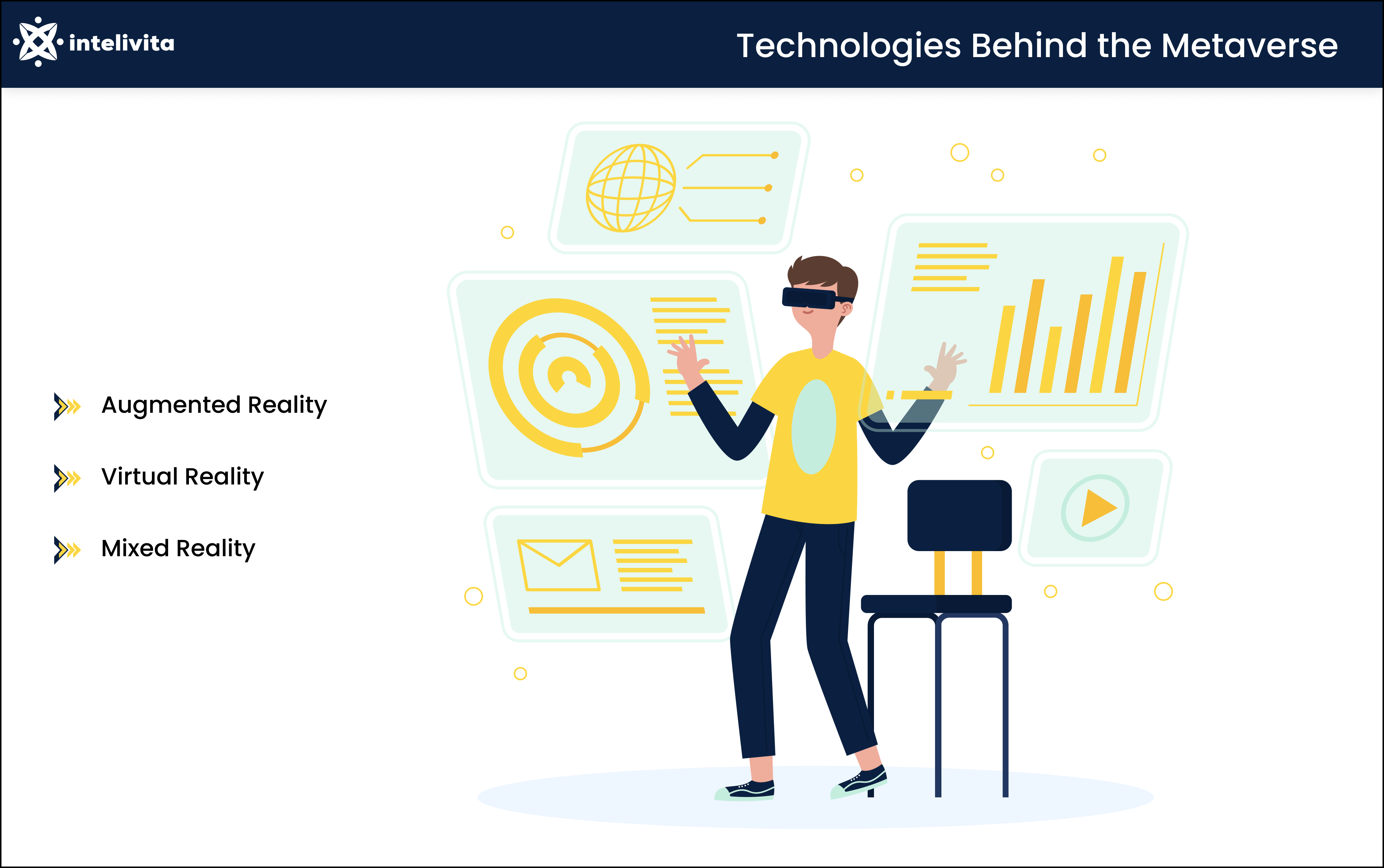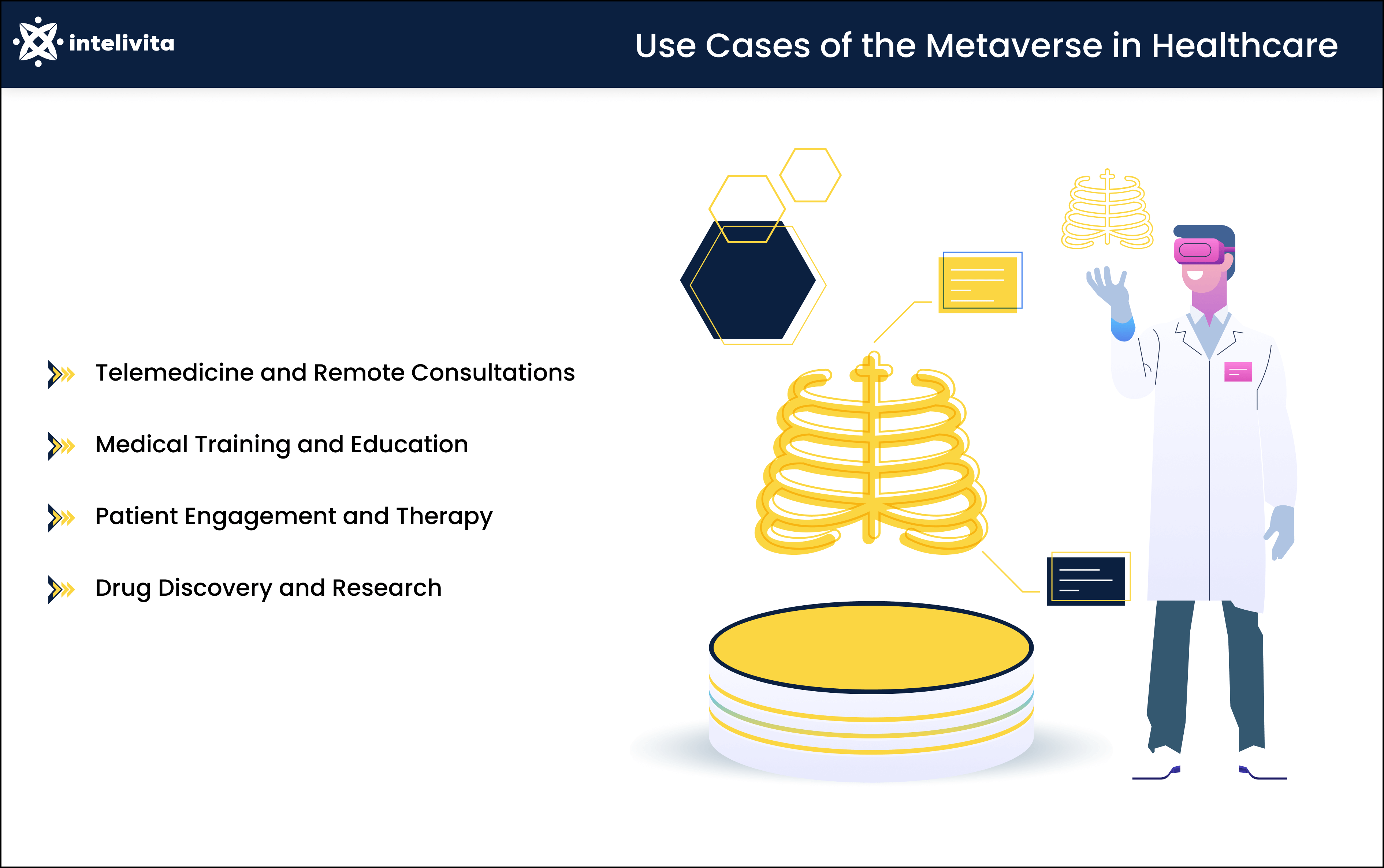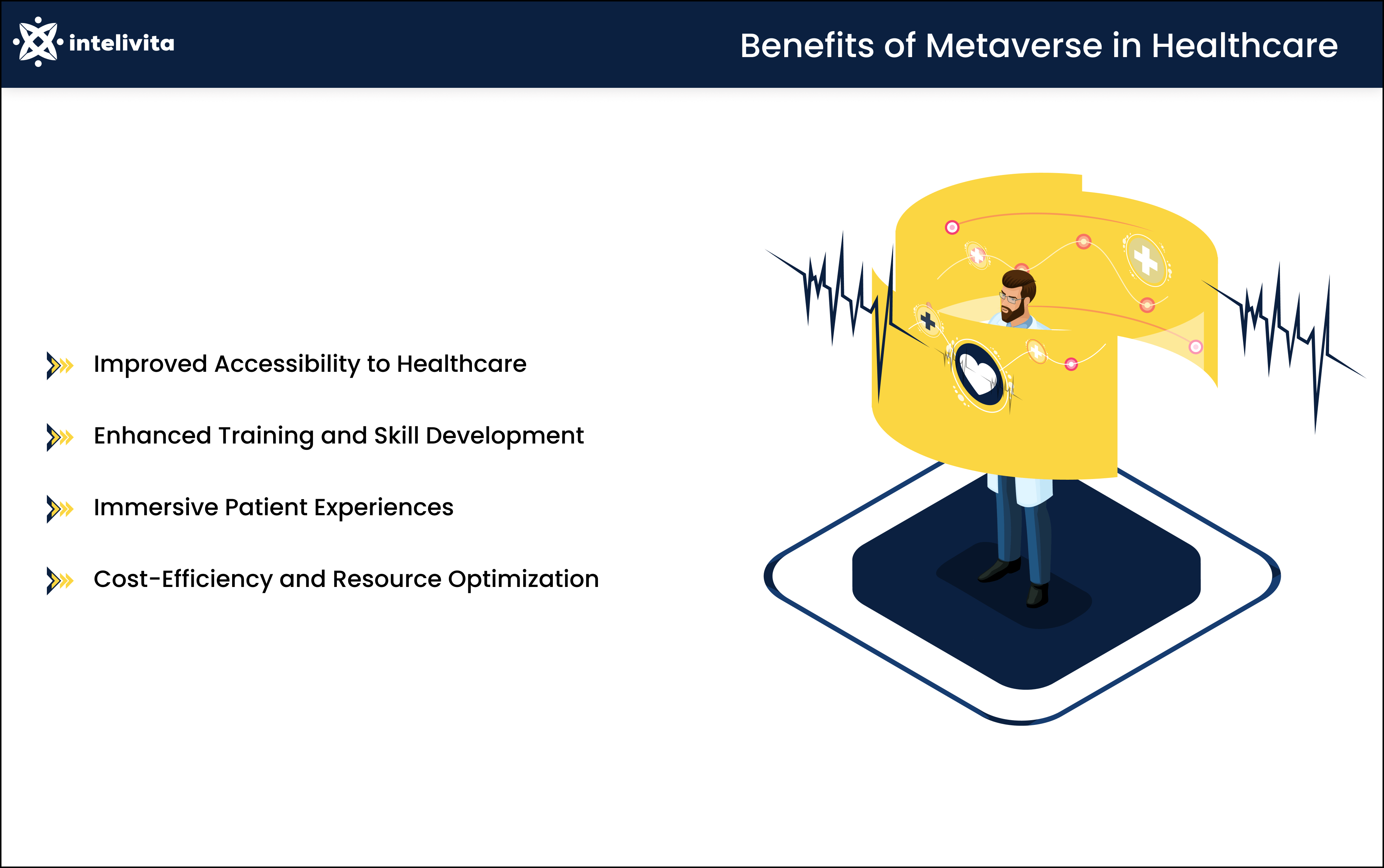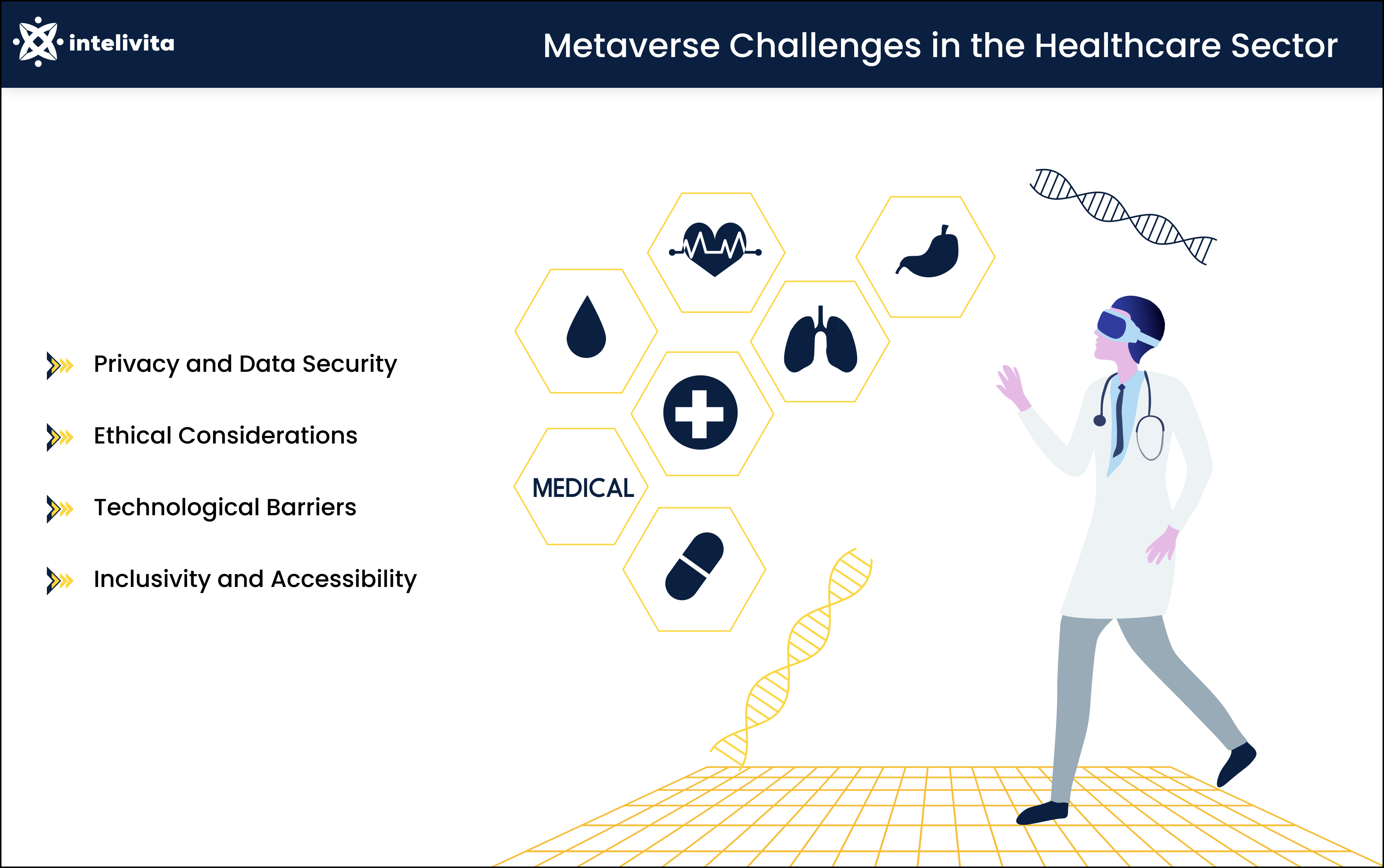The advent of the Metaverse, a term that once seemed the stuff of science fiction, has transcended the boundaries of imagination and is now a tangible reality.
Welcome to a new era where the Metaverse is set to revolutionize healthcare as we know it.
Are you prepared to journey into this digital realm where the physical and virtual worlds converge, offering unprecedented opportunities to enhance patient care, medical training, and research?
In this article, we will embark on an exploration of the Metaverse in the healthcare industry.
Join us as we traverse through the metaverse’s profound impact on the healthcare sector and discover the endless possibilities that lie ahead.
What is Metaverse in the Context of Healthcare?
In the context of healthcare, the term “metaverse” refers to an immersive digital environment where patients, healthcare providers, researchers, and medical professionals can interact, collaborate, and engage in various healthcare-related activities.
The metaverse in healthcare leverages technologies such as virtual reality (VR), augmented reality (AR), mixed reality (MR), and advanced digital platforms to create a dynamic and interconnected virtual healthcare ecosystem.
In this metaverse, patients can access virtual clinics and consult with healthcare professionals from the comfort of their homes, overcoming geographical barriers and enhancing accessibility to medical care.
Medical practitioners can use metaverse technologies for advanced training, conducting surgical simulations, and staying updated with the latest medical advancements.
It also offers innovative solutions for patient therapy, including virtual reality therapy for managing conditions like anxiety and phobias.
Moreover, the metaverse in healthcare facilitates collaborative research in virtual laboratories, enabling researchers from across the globe to work together on drug discovery, medical studies, and innovative healthcare solutions.
In essence, the metaverse in health care represents a paradigm shift in the way healthcare is delivered, making it more patient-centric, accessible, and technologically advanced.
It promises to revolutionize patient care, medical training, and research, offering an exciting glimpse into the future of the healthcare industry.
Deliver digital-first experiences to your customers through our metaverse development services.
Connect with our seasoned professionals to make your product stand out in the competitive market.
Technologies Behind the Metaverse
The Metaverse’s core components include:
Virtual Reality (VR)
Virtual Reality immerses users in entirely digital environments, creating a sense of presence and interactivity.
It operates via specialized hardware such as VR headsets, tracked controllers, and room-scale sensors.
These technologies combine to transport users into a computer-generated world where they can interact with their surroundings and other users, represented as avatars.
Augmented Reality (AR)
Augmented Reality enriches the real world with digital elements.
Unlike VR, AR does not create an entirely digital environment but instead overlays digital information onto the physical world.
This is achieved through devices like smartphones, smart glasses, or heads-up displays. For instance, AR can provide real-time information or holographic displays.
Mixed Reality (MR)
Mixed Reality fuses elements from both the physical and digital realms, creating an environment where digital objects and information coexist with the real world.
A prime example of MR technology is Microsoft’s HoloLens.
Users can interact with digital holograms while still being aware of their physical surroundings.
How Does the Metaverse Work
The Metaverse operates through a complex network of interconnected digital spaces and platforms.
Users access this network through a variety of devices, ranging from VR headsets to AR-equipped glasses or even everyday smartphones.
Once connected, users can navigate through these digital realms, interact with other avatars, and engage in a multitude of activities.
The technology behind the Metaverse facilitates real-time, interactive experiences.
Users’ movements and actions are tracked, allowing their avatars to mimic their gestures and expressions.
They can communicate with others via voice or text and engage in shared experiences, much like they would in the physical world.
Relevance of the Metaverse in Healthcare Industry
The Metaverse’s relevance in healthcare is monumental.
It offers a multitude of solutions that transcend geographical boundaries, enhance medical training, patient engagement, and research efficiency.
By blending the virtual and physical realms, it provides new possibilities in patient care and healthcare delivery.
From telemedicine to virtual medical simulations, the Metaverse is poised to transform the healthcare landscape, making it more accessible, efficient, and patient-centric.
Use Cases of the Metaverse in Healthcare
The integration of the Metaverse into healthcare has ushered in a new era of medical possibilities.
In this section, we’ll explore a number of applications of the Metaverse within the healthcare sector, spanning telemedicine, medical training, patient engagement, and drug research.
#1. Telemedicine and Remote Consultations
Virtual Clinics in the Metaverse
Virtual clinics within the Metaverse have redefined the way patients access healthcare.
This innovative approach transcends geographical limitations, enabling individuals to consult healthcare professionals from the comfort of their homes.
In these digital clinics, patients can engage in real-time consultations with physicians and specialists, presenting their medical concerns and receiving diagnoses and treatment recommendations.
The benefits of virtual clinics are manifold. They enhance healthcare accessibility, particularly for individuals residing in remote areas or those with limited mobility.
These digital encounters significantly reduce the need for physical visits to healthcare facilities, subsequently lowering the burden on already overcrowded healthcare systems.
Remote Surgery Assistance
One of the most remarkable applications of the Metaverse in healthcare is in the field of surgery.
Surgeons can now receive real-time assistance from experts located anywhere in the world during complex procedures.
Putting on VR headsets, surgeons can share their visual perspective with remote specialists, allowing them to provide guidance, advice, and even step-by-step instructions.
The implications are profound. Remote surgery assistance enhances surgical precision and patient safety.
It is particularly valuable in cases involving rare conditions or complex procedures where local expertise may be limited.
As a result, the Metaverse is revolutionizing the landscape of surgery, saving lives, and improving surgical outcomes.
#2. Medical Training and Education
Virtual Medical Simulations
Medical training has never been more immersive or effective than with virtual medical simulations offered by the Metaverse.
These simulations enable medical students and professionals to engage in lifelike scenarios without jeopardizing patient safety.
Through VR, users can practice surgical techniques, diagnose medical conditions, and manage patient care in a risk-free environment.
The benefits of virtual medical simulations are twofold. They allow learners to develop their skills and knowledge to a level of proficiency that cannot be achieved through traditional methods alone.
Additionally, these simulations enhance the capacity to understand complex medical concepts, offering a bridge between theory and practice.
Enhanced Learning Environments
Learning in the Metaverse is not just educational but also enjoyable.
Virtual environments provide a profound level of engagement that traditional classrooms and textbooks cannot match.
Complex medical concepts can be visualized and understood more intuitively, resulting in a deeper comprehension of the subject matter.
Furthermore, virtual learning environments promote active participation, encouraging students to be more involved in their education.
The immersive nature of these environments can inspire a sense of wonder and curiosity, fostering a new generation of healthcare professionals who are both highly skilled and deeply passionate about their work.
#3. Patient Engagement and Therapy
Virtual Reality Therapy
Virtual reality therapy is transforming the way patients cope with pain, anxiety, and a variety of psychological conditions.
This innovative approach immerses patients in therapeutic virtual worlds, where they can engage in activities designed to alleviate their symptoms and improve their overall well-being.
VR therapy offers a holistic approach to patient care. Creating immersive, distraction-free environments, helps individuals manage pain and anxiety more effectively.
Patients can find relief in calming, virtual settings, improving their mental and emotional state during medical procedures or recovery.
Reducing Healthcare Anxiety
Anxiety is a common companion to healthcare experiences, whether during hospital stays, surgeries, or even routine check-ups.
The Metaverse offers a powerful solution to this challenge. Exposing patients to soothing virtual environments, reduces anxiety and stress, creating a more comfortable and less daunting experience.
Patients can choose from a variety of calming scenarios, from serene beaches to peaceful forests.
These virtual escapes serve as a digital refuge from the often anxiety-inducing clinical settings.
Reducing healthcare anxiety, the Metaverse enhances the overall patient experience, contributing to better health outcomes.
#4. Drug Discovery and Research
Accelerated Drug Testing
Drug discovery and research are notorious for their lengthy timelines and high costs.
The Metaverse is poised to revolutionize this aspect of healthcare by providing virtual laboratories where scientists can collaborate and test potential drug compounds more efficiently.
Virtual labs allow researchers to simulate experiments and evaluate drug interactions without the need for physical materials.
The result is a significant reduction in research costs and time, accelerating the development of new treatments and potentially saving lives.
Collaborative Research in Virtual Labs
The Metaverse fosters collaboration on a global scale.
Researchers from different parts of the world can meet in virtual labs to share knowledge and ideas.
This collaborative environment accelerates medical breakthroughs by promoting innovation and efficiency.
Scientists can work together seamlessly, regardless of their geographical location, to tackle some of the most pressing healthcare challenges.
This interconnected approach to research paves the way for faster medical discoveries and advancements, leading to better patient care.
Benefits of Metaverse in Healthcare Sector
In this section, we will delve into the remarkable advantages that the Metaverse brings to the healthcare industry, from improved accessibility to enhanced training, and from immersive patient experiences to cost-efficiency.
-
Improved Accessibility to Healthcare
One of the most striking benefits of the Metaverse in healthcare is its ability to significantly improve accessibility to healthcare services.
Geographical barriers no longer pose an obstacle, enabling individuals in remote and underserved areas to access high-quality medical care.
Patients are no longer confined by the limitations of their physical location, thanks to the power of the Metaverse.
Virtual clinics and remote consultations provide a prime example of this.
Patients can now consult with healthcare professionals, no matter where they are in the world.
This is particularly valuable for those residing in rural areas or locations with limited access to medical facilities.
Moreover, individuals with mobility issues or disabilities find it much easier to engage with healthcare providers in virtual environments.
The result is a more equitable and accessible healthcare system that bridges the gap between urban and rural populations.
The Metaverse ensures that everyone, regardless of their physical location, can benefit from timely and quality healthcare services.
-
Enhanced Training and Skill Development
The Metaverse is a game-changer when it comes to training and skill development within the healthcare industry.
Medical professionals, from students to experienced practitioners, can utilize virtual environments to enhance their expertise, hone their skills, and stay up-to-date with the latest medical advances.
Virtual medical simulations are a prime example of how the Metaverse transforms training.
Medical students can engage in lifelike simulations of surgical procedures or patient diagnoses, allowing them to practice and refine their techniques without putting real patients at risk.
It’s a safe and immersive learning experience that ensures that healthcare professionals are well-prepared and proficient in their respective fields.
Furthermore, these virtual environments provide a unique opportunity for hands-on training that was previously only available in the physical world.
Medical professionals can experiment with new treatments, surgical techniques, and medical devices, gaining invaluable experience in a risk-free environment.
-
Immersive Patient Experiences
Patients are no longer passive recipients of healthcare but active participants in their care journeys, thanks to the Metaverse.
This transformation is primarily driven by the immersive and engaging nature of virtual healthcare experiences.
Virtual reality therapy is a prime example of how the Metaverse revolutionizes patient experiences.
Patients can be transported to serene and calming virtual environments while undergoing medical procedures, helping them manage pain and anxiety more effectively.
The immersive quality of virtual reality therapy enhances overall well-being, contributing to better patient outcomes.
In addition, patients can actively engage with their treatment plans in virtual environments. They can monitor their progress, set goals, and receive continuous support.
This level of involvement fosters a sense of empowerment and ownership over their health, leading to improved adherence to treatment plans and more positive health outcomes.
-
Cost-Efficiency and Resource Optimization
The Metaverse introduces a degree of cost-efficiency and resource optimization that is invaluable to healthcare institutions.
Virtual healthcare environments streamline operations, reduce overhead costs, and enhance resource allocation.
Hospitals and healthcare facilities can significantly optimize their resources.
With virtual clinics and remote consultations, they can reduce the strain on physical facilities, ensuring that in-person visits are reserved for cases that truly require them.
This not only saves time and resources but also minimizes the risk of disease transmission in crowded healthcare settings.
And, the Metaverse provides healthcare professionals with efficient tools for collaboration.
Virtual labs, for instance, allow researchers to work together from different corners of the world, reducing travel expenses and ensuring a more efficient use of time and resources.
This interconnected approach to research accelerates medical discoveries and advancements, ultimately saving costs and lives.
Examples of Metaverse Integration in Healthcare
The integration of the Metaverse into healthcare has already yielded transformative results in various real-world applications.
Below are some compelling case studies that highlight the innovative use of the Metaverse in the healthcare sector.
1. Osso VR
Osso VR is a leading example of how the Metaverse is reshaping medical training.
This platform provides realistic virtual simulations for surgical training.
Surgeons and medical professionals can perform procedures in a virtual operating room, complete with 3D models, tools, and realistic haptic feedback.
One of the most significant advantages is that it allows medical practitioners to practice and refine their skills without the need for cadavers or risking patient safety.
Osso VR has demonstrated remarkable success in enhancing surgical skills and knowledge, reducing training costs, and, ultimately, improving patient outcomes.
2. AppliedVR
AppliedVR is a pioneer in using virtual reality to manage pain and anxiety.
They offer a library of immersive experiences that patients can access through VR headsets.
These experiences range from calming beach scenes to virtual mindfulness programs.
In a study conducted at Cedars-Sinai Medical Center, it was found that using AppliedVR’s VR therapy reduced pain and anxiety levels during medical procedures.
Patients who engaged with VR therapy reported a 24% reduction in pain and a 13% reduction in anxiety, emphasizing the potential of the Metaverse to improve patient well-being.
3. EchoPixel
EchoPixel, Inc. provides an innovative solution for medical imaging and diagnosis.
Their True 3D technology converts 2D medical images, such as CT scans and MRIs, into detailed 3D reconstructions.
Medical professionals can then explore these reconstructions in a virtual 3D space.
This not only enhances their understanding of complex medical conditions but also aids in surgical planning.
Studies have shown that True 3D has been instrumental in improving diagnostic accuracy and surgical outcomes, reducing procedure times, and enhancing patient care.
4. HoloLens in Medical Education
Microsoft’s HoloLens, a mixed-reality device, has found substantial application in medical education.
In an example from Case Western Reserve University, medical students utilize HoloLens to visualize and interact with detailed 3D anatomical models.
This hands-on approach enhances their understanding of human anatomy and enables them to explore complex structures from different angles.
The use of HoloLens in medical education has resulted in improved learning outcomes and has set the stage for more advanced and engaging medical training methods.
Metaverse Challenges and Concerns in the Medical Sector
While the Metaverse holds enormous promise in the healthcare sector, it also raises significant challenges and concerns that need to be addressed.
In this section, we will explore the challenges of metaverse in the medical industry.
Privacy and Data Security
The integration of the Metaverse into healthcare introduces new dimensions of privacy and data security concerns.
Patients and healthcare providers need to be assured that their sensitive medical information is protected and their privacy is respected.
Privacy Concerns: The Metaverse collects vast amounts of data, including patient health records, behavioral patterns, and biometric information.
The challenge lies in ensuring that this data is stored securely and not subject to unauthorized access.
A breach of patient privacy can have severe consequences, not only in terms of data theft but also in the potential for identity theft or misuse of sensitive medical information.
Data Security: The Metaverse operates in a networked environment, and security vulnerabilities can be exploited by malicious actors.
Ensuring data encryption, secure connections, and robust access control measures are essential to prevent data breaches.
Healthcare institutions must also adhere to strict data security regulations to protect patient data.
Ethical Considerations
As the Metaverse continues to advance, it brings forth a multitude of ethical considerations that demand attention and resolution.
Commercial Interests vs. Patient Welfare: The Metaverse opens the door to commercial interests, potentially leading to situations where profit motives could conflict with patient welfare.
Healthcare providers and technology companies must strike a balance between providing innovative healthcare solutions and ensuring that patient well-being remains the top priority.
Informed Consent: The process of obtaining informed consent from patients in virtual healthcare environments raises unique ethical questions.
Patients must fully understand the implications of their interactions within the Metaverse.
Ethical standards should ensure that patients are aware of the nature of virtual healthcare, the potential risks, and the limits of technology.
Technological Barriers
Not all healthcare institutions are equipped to seamlessly adopt Metaverse technologies, which creates challenges related to infrastructure and technology integration.
Limited Access: Smaller or underfunded healthcare facilities may struggle to invest in the necessary technology for Metaverse integration.
This can create disparities in access to advanced healthcare services, potentially leaving some patients without the benefits of virtual healthcare.
Training and Familiarity: Healthcare professionals must undergo training to effectively utilize Metaverse technologies.
The learning curve for using these tools can be steep, particularly for those who are not tech-savvy.
Ensuring that healthcare providers are proficient in using Metaverse technologies is crucial to delivering high-quality care.
Inclusivity and Accessibility
The Metaverse must be inclusive, ensuring that all patients, regardless of their physical abilities or technological familiarity, can benefit from virtual healthcare.
Accessibility for People with Disabilities: Virtual healthcare platforms need to be accessible to individuals with disabilities.
This means accommodating features such as screen readers for the visually impaired and user-friendly interfaces for those with mobility challenges.
Broadband Access: To fully harness the capabilities of the Metaverse, users need access to high-speed internet connections.
In regions with limited broadband access, the Metaverse may remain an inaccessible technology. Bridging this digital divide is a critical step toward ensuring inclusivity.
Metaverse Trends and Possibilities for Healthcare
The Metaverse is evolving at an unprecedented pace, and its impact on the healthcare industry is poised to expand even further.
In this section, we’ll explore the trends and possibilities within the Metaverse, focusing on technological advancements, its growing adoption in healthcare, and its potential impact on the industry.
Technological Advancements
The Metaverse’s future in healthcare is closely intertwined with ongoing technological advancements that continue to push the boundaries of what’s possible.
- Improved Virtual Reality: Virtual reality technology is advancing rapidly. VR headsets are becoming more immersive, comfortable, and affordable.
Enhanced graphics and haptic feedback provide a more realistic experience, crucial for medical training and therapy. - Augmented Reality Innovations: Augmented reality is poised for significant growth. Devices like smart glasses are becoming more mainstream, offering potential for real-time, context-aware medical information overlay.
This could assist healthcare professionals during surgeries or patient consultations. - Artificial Intelligence Integration: AI plays a pivotal role in the Metaverse’s future. Machine learning algorithms can analyze vast amounts of medical data, helping with diagnostics and treatment plans.
AI-powered virtual assistants are likely to become a fixture in healthcare, offering real-time support to medical professionals. - Blockchain for Data Security: The Metaverse’s integration with blockchain technology can bolster data security.
Blockchain’s transparency and encryption capabilities make it an ideal candidate for safeguarding electronic health records, ensuring patient privacy, and secure data sharing. - 5G Connectivity: The rollout of 5G networks will be a game-changer for the Metaverse.
It promises low latency and high bandwidth, enabling real-time interactions and data transfer.
In healthcare, this means smoother telemedicine experiences and improved collaboration in virtual research labs.
Metaverse Adoption in Healthcare
The adoption of the Metaverse in healthcare is gaining momentum. Several trends and factors are driving this uptake.
Telemedicine Evolution: Telemedicine has evolved beyond video calls to immersive virtual clinic experiences. As healthcare regulations adapt to accommodate virtual care, we can expect more healthcare providers to integrate the Metaverse into their service offerings.
Medical Training Paradigm Shift: Medical education is embracing Metaverse technologies. Medical schools and institutions are investing in virtual simulations, making training more accessible and effective. Expect to see an increasing number of healthcare professionals entering the workforce with Metaverse training.
Pharmaceutical Research Collaboration: Collaboration in the Metaverse has the potential to accelerate drug discovery. Virtual labs facilitate remote cooperation among researchers worldwide, shortening the time it takes to bring new medications to market.
Mental Healthcare Innovation: The Metaverse is opening up innovative possibilities for mental health treatment. VR therapy, for instance, is gaining recognition as an effective tool for managing conditions like anxiety, phobias, and PTSD.
Potential Impact on the Healthcare Industry
The Metaverse’s impact on the healthcare industry extends far beyond technological advancements and adoption trends. It has the potential to reshape healthcare fundamentally.
1. Improved Patient Outcomes: The immersive and interactive nature of the Metaverse enhances patient engagement and adherence to treatment plans. This could lead to improved health outcomes and a more proactive approach to healthcare.
2. Accessible and Equitable Care: As the Metaverse breaks down geographical barriers, it promises to make healthcare more accessible and equitable. Rural and underserved populations can access high-quality care, reducing disparities in healthcare.
3. Cost Efficiency: The efficient use of Metaverse technologies, such as telemedicine and virtual labs, can lead to cost savings for healthcare institutions. This could translate into more affordable healthcare for patients.
4. Advances in Medical Research: The Metaverse’s potential for global collaboration in medical research holds the promise of accelerating the discovery of new treatments and therapies.
This, in turn, could lead to breakthroughs in various medical fields.
5. Ethical Considerations: As the Metaverse becomes more integrated into healthcare, there will be an increased focus on addressing ethical concerns, patient privacy, and data security. Regulatory frameworks will evolve to safeguard the interests of both patients and healthcare providers.
Metaverse’s Ethical and Legal Implications in the Medical Sector
Metaverse with its numerous advantages comes important ethical and legal considerations that need to be addressed to ensure the responsible use of these technologies.
-
Regulation and Governance
Regulatory Frameworks: As the Metaverse continues to evolve and expand its presence in healthcare, the need for comprehensive regulatory frameworks becomes increasingly evident.
Governments and healthcare institutions must develop guidelines and standards to ensure that the Metaverse operates within established ethical boundaries.
These regulations will address issues such as data privacy, cybersecurity, and patient rights.
Cross-Border Challenges: The global nature of the Metaverse poses challenges for regulatory bodies.
Virtual healthcare environments can facilitate international patient-doctor interactions.
Addressing these cross-border healthcare scenarios requires harmonization of regulations to ensure patient safety and data protection across different jurisdictions.
Accountability: Regulatory frameworks must establish accountability for healthcare providers and technology companies.
Transparency and accountability are essential to building trust in virtual healthcare settings. Ensuring that technology companies adhere to ethical and safety standards is paramount.
-
Informed Consent in Virtual Healthcare
Virtual Informed Consent: Obtaining informed consent from patients in virtual healthcare environments is a crucial ethical consideration.
Patients must understand the nature of virtual healthcare, its limitations, and the potential risks.
This process is more complex in the Metaverse, as patients must be informed about how their data will be used and secured.
Minors and Virtual Healthcare: When treating minors in virtual environments, obtaining informed consent becomes even more critical.
Parents or guardians need to understand and consent to the virtual treatment of their children, ensuring their well-being is preserved.
Continuous Consent: In virtual healthcare settings, continuous informed consent may be necessary.
Patients should have the right to revoke their consent at any time, particularly when engaging in long-term virtual therapies or research studies.
-
Liability and Malpractice in Virtual Environments
Defining Liability: Determining liability in virtual healthcare is a complex challenge.
When medical errors occur in virtual settings, it may not always be straightforward to identify the responsible party.
Is it the healthcare provider, the technology company, or a combination of both?
Establishing liability precedents will be a critical aspect of ethical and legal considerations.
Standard of Care: Virtual healthcare environments should adhere to the same standards of care as traditional healthcare settings.
Healthcare professionals must provide the same level of expertise and diligence, ensuring that patient well-being is not compromised.
Malpractice Insurance: Healthcare providers engaged in virtual healthcare may require specialized malpractice insurance to address potential liability issues specific to these environments.
Insurers will need to develop policies that reflect the unique risks associated with virtual healthcare.
Metaverse Solutions for Healthcare: Contact Us to Get Started
The Metaverse is poised to redefine the healthcare landscape, offering innovative solutions that enhance patient care, medical training, and research.
The potential to improve patient outcomes, accessibility, and cost-efficiency is significant, but it also comes with a host of ethical, legal, and technological challenges that require careful consideration.
The possibilities are boundless, from enhanced surgical training to VR therapy for mental health.
With continued technological advancements and increasing adoption, the Metaverse’s impact on healthcare is set to expand.
In this transformative journey, if you are looking to explore the possibilities and integrate Metaverse technologies into your healthcare services, our team of Metaverse development professionals is ready to guide you.
Contact our metaverse development experts to embark on this exciting journey toward the future of healthcare in the Metaverse.








